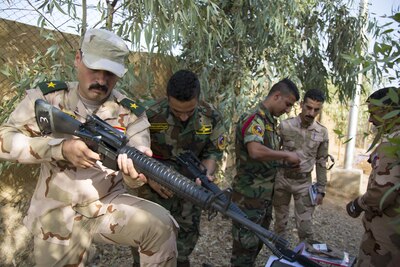By Cheryl Pellerin DoD News, Defense Media Activity
WASHINGTON, Oct. 4, 2017 — The end of the Islamic State of
Iraq and Syria is in sight, but the military effort is only one part of the
coalition campaign to defeat ISIS, a Defense Department official told a House
Armed Services subcommittee yesterday.
Mark Swayne, acting deputy assistant secretary of defense
for stability and humanitarian affairs in the Office of the Assistant Secretary
of Defense for Special Operations and Low-Intensity Conflict, testified before
the HASC Subcommittee on Oversight and Investigations.
The topic was DoD efforts to enable Iraq to achieve and
maintain stability after the recent liberation of Mosul.
“The key to preventing the re-emergence in Iraq of ISIS or
any other violent extremist organization is effective and inclusive
governance,” Swayne said in prepared remarks.
“For this to develop,” he added, “the United States and our
coalition partners must continue to work by, with and through the government of
Iraq to consolidate military gains and stabilize liberated areas.”
Such an approach puts the military instrument of power in a
supporting, enabling role, Swayne said.
Winning Momentum
The Iraqi security forces led the way in defeating ISIS in
Mosul, liberating the city and freeing its people. The Iraqi forces carried a
winning momentum to the next ISIS stronghold in Tal Afar, delivering swift
victory there, the acting deputy assistant secretary said.
“One year ago, virtually all of Ninevah governorate was
controlled by ISIS. In late August, Baghdad announced [its] complete
liberation,” Swayne said. “Every day, Iraqi security forces fight to return
their country to the Iraqi people and out of the hands of ISIS terrorists.”
As Iraqi security forces maintain the initiative and
continue to bring the fight to ISIS, they are backed by strong Iraqi leadership
in Baghdad and unwavering support from a 73-member global coalition, he added.
Swayne said that to make possible long-term peace in Iraq,
the United States and its coalition partners are bolstering the government of
Iraq, enabling security services and promoting local reconciliation among the
Iraqi people.
“In the fight to defeat ISIS,” he said, “we saw
unprecedented cooperation between the Kurdish peshmerga forces and the Iraqi
security forces -- fighting and taking casualties to achieve a common goal for
Iraq. The recent Kurdish referendum on independence presents a challenge to
this cooperation but hopefully this can be overcome.”
Long-Term Commitment
The military defeat of ISIS is the first step in a long-term
commitment to rid the world of violent extremist organizations, Swayne added,
noting that the seeds of the next extremist resurgence lie in the rubble of the
defeat ISIS campaign.
“Following the defeat of ISIS’ physical caliphate, it is
vital that the government of Iraq, with the support of the U.S. government and
the international community, continues to prioritize humanitarian assistance
and stabilization efforts in order to allow the expedient return of internally
displaced persons,” he said.
Millions of Iraqis have returned home but more than 3.2
million are still displaced because of ISIS occupation, Shayne said.
“We are working closely with the Department of State, the
U.S. Agency for International Development, the United Nations and our coalition
partners on near-term stabilization activities to support the government of
Iraq,” he said. Examples of U.S.-supported activities include demining,
removing rubble and restoring essential services and access to potable water.
DoD does not have the authority to conduct stabilization
activities on its own, but it continues to support interagency partners in
their efforts to stabilize Iraq and the results speak for themselves, he added.
More than 2.2 million Iraqis, including more than a quarter
million Mosul residents, have returned home, Shayne said, and there is more
work to do.
Continuing the Global Campaign against ISIS
Shayne said part of ISIS’s success comes from its ability to
capitalize on sectarian grievances and disenfranchisement.
“Allegations of abuses, extrajudicial killings and other Law
of Armed Conflict violations feed ISIS’ narrative that the government of Iraq
is illegitimate,” Shayne said. “For this reason we continue to advise the
government of Iraq on the importance of transparency and investigating all
credible allegations of abuse.”
Iraq’s Prime Minister Haider al-Abadi is personally
committed to the effort, Shayne said, and has said that he will thoroughly
investigate any such allegations and hold those deemed responsible accountable
in accordance with due process and Iraqi law.
Even after the ISIS caliphate is physically destroyed, the
global campaign to defeat ISIS will continue, he added, to bolster long-term
stability in Iraq by engaging ISIS globally and preventing the flow of foreign
fighters back to the region.
The deputy assistant secretary said the whole-of-government
global campaign will continue to attack ISIS and its affiliates to further
degrade their ability to recruit and maintain a fighting force, and the
U.S.-led coalition and interagency partners will pressure the international
community to counter the radical Salafi-jihadist ideology that fuels many of
the world’s violent extremist organizations.
“All of these efforts will serve to help prevent a
resurgence of ISIS, provide an opportunity for inclusive and effective
governance at all levels to thrive and promote long-term stability,” Shayne
said.








No comments:
Post a Comment